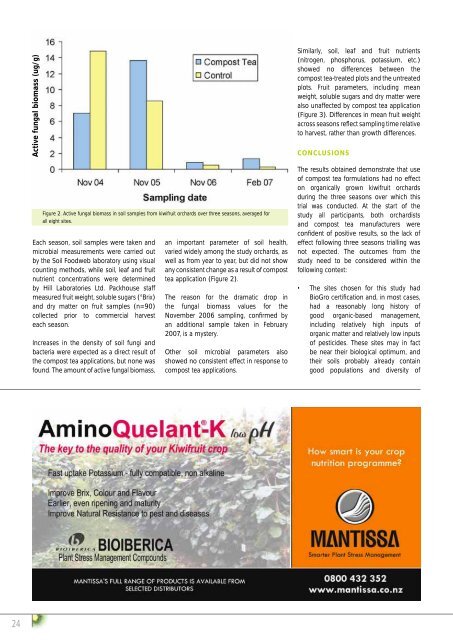Thirsty vines Summer girdling Compost teas Organic marketing The ...
Thirsty vines Summer girdling Compost teas Organic marketing The ...
Thirsty vines Summer girdling Compost teas Organic marketing The ...
Create successful ePaper yourself
Turn your PDF publications into a flip-book with our unique Google optimized e-Paper software.
24<br />
Active fungal biomass (ug/g)<br />
Figure 2. Active fungal biomass in soil samples from kiwifruit orchards over three seasons, averaged for<br />
all eight sites.<br />
Each season, soil samples were taken and<br />
microbial measurements were carried out<br />
by the Soil Foodweb laboratory using visual<br />
counting methods, while soil, leaf and fruit<br />
nutrient concentrations were determined<br />
by Hill Laboratories Ltd. Packhouse staff<br />
measured fruit weight, soluble sugars (°Brix)<br />
and dry matter on fruit samples (n=90)<br />
collected prior to commercial harvest<br />
each season.<br />
Increases in the density of soil fungi and<br />
bacteria were expected as a direct result of<br />
the compost tea applications, but none was<br />
found. <strong>The</strong> amount of active fungal biomass,<br />
an important parameter of soil health,<br />
varied widely among the study orchards, as<br />
well as from year to year, but did not show<br />
any consistent change as a result of compost<br />
tea application (Figure 2).<br />
<strong>The</strong> reason for the dramatic drop in<br />
the fungal biomass values for the<br />
November 2006 sampling, confi rmed by<br />
an additional sample taken in February<br />
2007, is a mystery.<br />
Other soil microbial parameters also<br />
showed no consistent effect in response to<br />
compost tea applications.<br />
Similarly, soil, leaf and fruit nutrients<br />
(nitrogen, phosphorus, potassium, etc.)<br />
showed no differences between the<br />
compost tea-treated plots and the untreated<br />
plots. Fruit parameters, including mean<br />
weight, soluble sugars and dry matter were<br />
also unaffected by compost tea application<br />
(Figure 3). Differences in mean fruit weight<br />
across seasons refl ect sampling time relative<br />
to harvest, rather than growth differences.<br />
CONCLUSIONS<br />
<strong>The</strong> results obtained demonstrate that use<br />
of compost tea formulations had no effect<br />
on organically grown kiwifruit orchards<br />
during the three seasons over which this<br />
trial was conducted. At the start of the<br />
study all participants, both orchardists<br />
and compost tea manufacturers were<br />
confi dent of positive results, so the lack of<br />
effect following three seasons trialling was<br />
not expected. <strong>The</strong> outcomes from the<br />
study need to be considered within the<br />
following context:<br />
• <strong>The</strong> sites chosen for this study had<br />
BioGro certifi cation and, in most cases,<br />
had a reasonably long history of<br />
good organic-based management,<br />
including relatively high inputs of<br />
organic matter and relatively low inputs<br />
of pesticides. <strong>The</strong>se sites may in fact<br />
be near their biological optimum, and<br />
their soils probably already contain<br />
good populations and diversity of


